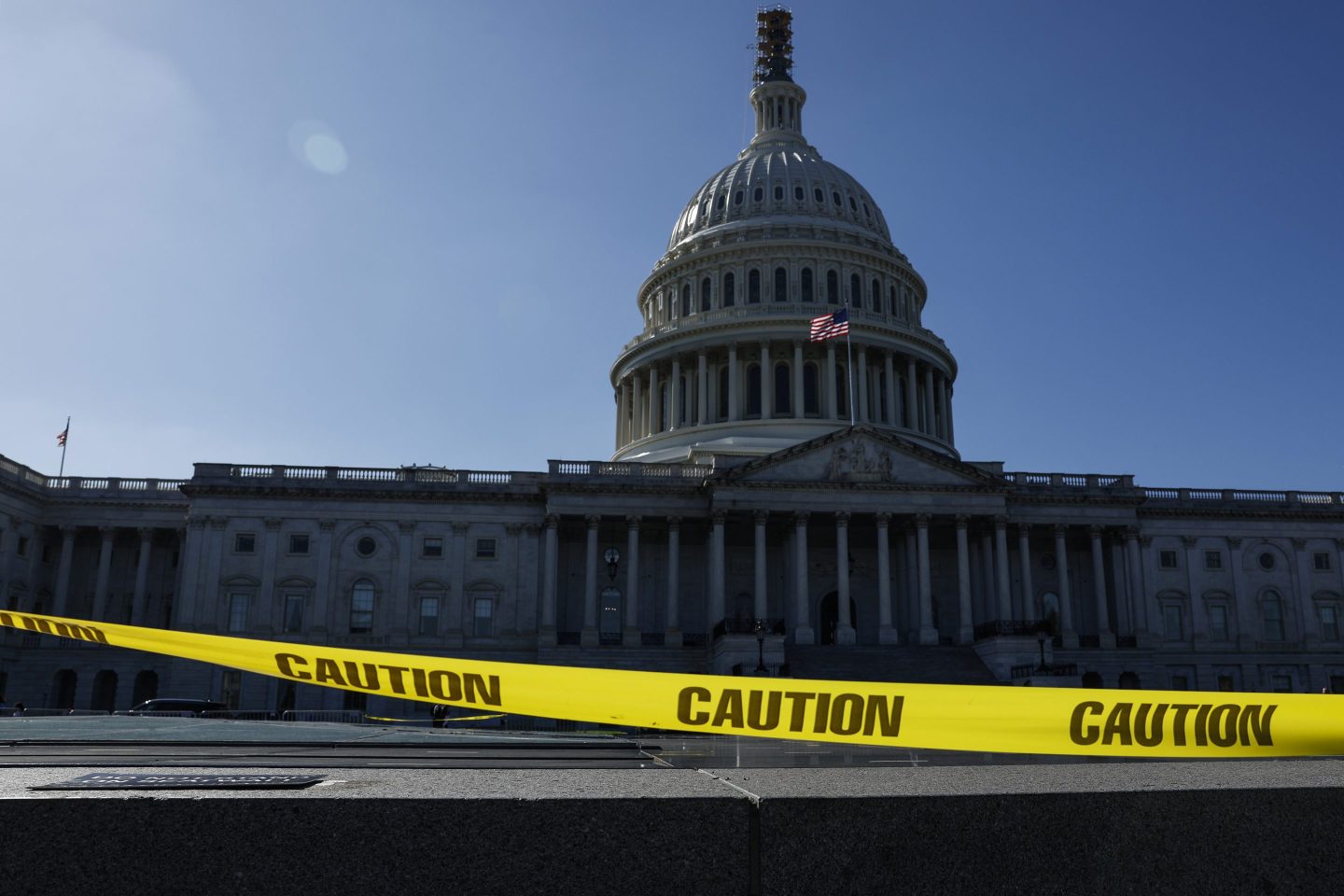Good morning, Peter Vanham here in Geneva, filling in for Alan.
Looking from the outside in, it’s hard to understand why the most powerful government in the world decides to shut itself down every few years. As another U.S government shutdown looms, the financial consequences for millions of employees are immediate; those for the U.S. government’s reputation and creditworthiness appear farther down the road.
CEOs are concerned about a shutdown’s impact on the broader economy. In a new poll by the Committee for Economic Development (CED), a division of the Conference Board, a nonpartisan think tank, a large majority (91%) of CEOs and board members surveyed said they are concerned that a government shutdown lasting more than a couple of days will hurt the economy.
And a shutdown—perhaps a prolonged one—is indeed likely. With the deadline to avoid it—Saturday at midnight—just some 40 hours away, Goldman Sachs now puts the odds of a shutdown at 90%, Fortune‘s Will Daniel reported yesterday. If it does happen, each week of a shutdown will cost the U.S. approximately 0.2% in quarterly annualized growth, the bank also calculated.
In response, more than 4 out of 10 business leaders in the CED poll said they are already adjusting their business plans. It is a frustrating reality that amid all the other global turmoil and economic headaches, American business leaders need be concerned about their own government’s ability to fund itself to the point of shifting their business plans.
How did it come to this? The immediate trigger, this time, are hardline demands of half a dozen Republican rebels, including Matt Gaetz, Lauren Boebert, and Marjorie Taylor-Greene, the FT reported yesterday. In that light, it is surprising that a majority (56%) of business leaders in the CED survey put the blame for the current situation on both parties.
But perhaps that is because of the longer-term causes of the shutdown. After so many bruising shutdown experiences in the past, it is baffling that there’s still no bipartisan committee or initiative to prevent them. The CED, for its part, suggests a “congressional commission on fiscal responsibility,” and sees broad support for it among its survey respondents.
Whether that message will get any traction in today’s dysfunctional Congress, however, remains far from certain. Adjusting one’s business forecasts may be the more pragmatic way forward for now.
More news below.
Peter Vanham
peter.vanham@fortune.com
@petervanham
TOP NEWS
Yaccarino meets X’s bankers
X CEO Linda Yaccarino is scheduled to meet the social media company’s bankers next week and present her plans to revive the platform’s fortunes. The seven major banks involved in the meeting hold about $13 billion of debt tied to Elon Musk’s acquisition of the company last year. The banks hope that a compelling plan from Yaccarino will help them sell the debt to someone else. Financial Times
Is Nvidia too big?
French competition regulators raided the local offices of Nvidia on Wednesday as part of an antitrust probe. French officials said the measure was part of a larger investigation into the cloud-computing sector. Nvidia’s chips are key to training the models that underpin programs like ChatGPT, and AI hype has helped drive the chipmaker to an over $1 trillion valuation. The Wall Street Journal
COMAC’s large order
China Eastern Airlines is buying 100 C919 airplanes, the largest order yet for China’s homegrown competitor to Boeing’s 737 Max and Airbus’s A320. The C919, developed by state-owned manufacturer COMAC, made its first commercial flight in late May, more than 15 years after the jet was first announced. China Eastern expects the order to be completed by 2031. Reuters
AROUND THE WATERCOOLER
Top Twitch streamers call on company to fix a hack that lets users rack up fake views and defraud advertisers: ‘It’s just yucky and deceptive’ by Alexandra Sternlicht
Silicon Valley pioneer Vinod Khosla says VCs need to make riskier climate tech investments by Rachyl Jones
Deutsche Bank studied 34 past U.S. recessions to identify key warning signs and found that all 4 are flashing red right now by Will Daniel
Delta’s CEO knows he went ‘too far’ with unpopular SkyMiles changes, and promises to keep customers on board with a reshuffle by Eleanor Pringle
The congressman investigating four VC firms with ties to China has a message: This is just the beginning by Jessica Mathews
This edition of CEO Daily was curated by Nicholas Gordon.
This is the web version of CEO Daily, a newsletter of must-read insights from Fortune CEO Alan Murray. Sign up to get it delivered free to your inbox.













